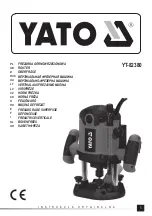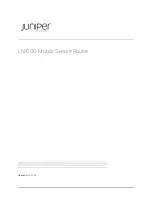
AT-8100 Series Version 2.2.5.0 Web Interface User’s Guide
69
cannot select them. To change the
Configure Speed
and
Configure Duplex
fields, change the Negotiation setting to
“Manual.”
Note
When the port type is 1000Base fiber optic, the Negotiation must be
“Auto”, and you are not allowed to change the setting to “Manual.”
Current Speed
— Displays the current speed of the port.
Current Duplex Mode
— Displays the current duplex mode setting
of the port.
Configure Speed
— Select a port speed from the pull-down menu.
For example, for a 10/100Base-T port, the options are 10 and 100.
For a 1000Base-SX/LX port, 1000 is the only option. You can enter
a value in this field when the Negotiation is set to “Manual.”
Configure Duplex Mode
— Select the duplex mode of the twisted-
pair port. Choose from Half, Full, or Auto. A port operating in half-
duplex mode can either receive or transmit packets, but not both at
the same time. Ports operating in full-duplex can both send and
receive packets, simultaneously.
Polarity
— Select the wiring configuration of the twisted-pair port.
When a port is operating at 1000 Mbps, the only option is “AUTO.”
When operating at 10 or 100 Mbps, in either half- or full-duplex
mode, the options are “AUTO,” “MDI,” and “MDI-X.”
To forward traffic, a port on the switch and a port on a network
device must have different settings. For instance, the wiring
configuration of a switch port has to be MDI if the wiring
configuration on a port on a network device is MDIX.
To set the polarity to either “MDI” or “MDI-X” on a port, the
Negotiation setting must be “Manual.” A port with the Auto-
Negotiation must set the polarity to “AUTO.”
Back Pressure Status
— Enable or disable back pressure on a
port that is operating at 10 or 100 Mbps in half-duplex mode. Back
pressure is used by a port during periods of packet congestion to
temporarily stop their network counterparts from transmitting more
packets. This prevents a buffer overrun and the subsequent loss
and retransmission of network packets. A port initiates back
pressure by transmitting on the shared link to cause a data
collision, which causes its link partner to cease transmission.
To enable or disable back pressure on a port, the speed and
duplex mode must be specified manually.
Back Pressure Limit (1 - 7935)
— Enter a threshold level for back
pressure on the port. Enter the number of cells for back pressure.
Summary of Contents for AT-8100L/8POE
Page 4: ......
Page 10: ...Contents 10...
Page 14: ...Figures 14...
Page 22: ...Chapter 1 AT 8100 Series Version 2 2 5 0 Web Browser Interface 22...
Page 84: ...Chapter 5 Setting Port Statistics 84...
Page 92: ...Chapter 6 Port Mirroring 92...
Page 100: ...Chapter 7 Spanning Tree Protocol on a Port 100...
Page 120: ...Chapter 9 Link Aggregation Control Protocol LACP 120...
Page 130: ...Chapter 10 Setting Static Port Trunks 130...
Page 148: ...Chapter 12 Spanning Tree Protocols on the Switch 148...
Page 158: ...Chapter 13 Internet Group Management Protocol IGMP Snooping 158...
Page 168: ...Chapter 14 IGMP Snooping Querier 168...
Page 178: ...Chapter 15 Power Over Ethernet PoE 178...
Page 230: ...Chapter 19 Setting IPv4 and IPv6 Addresses 230...
Page 242: ...Chapter 20 Access Control Lists ACL 242...
Page 246: ...Chapter 21 Setting Static Routes 246 8 Click Apply 9 Click SAVE...
Page 250: ...Chapter 21 Setting Static Routes 250...
Page 319: ...AT 8100 Series Version 2 2 5 0 Web Interface User s Guide 319 Model Name Asset ID...
Page 320: ...Chapter 25 LLDP and LLDP MED 320...















































